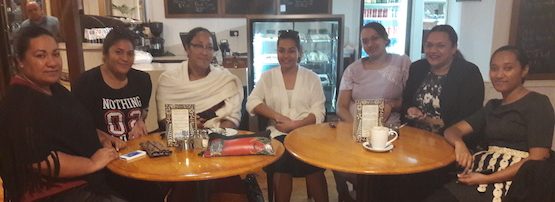
“In Tonga, where there’s food, there’s attention.”
This is the well known preface that Seluvaia Kauvaka (Selu for short) used to launch Tonga’s very first Women in ICT meeting, held in late June this year.
Having talked about establishing such a group for years with other female colleagues working in the industry, Selu took it upon herself to make it happen by sending out invitations for free coffee.
“I emailed all the women I had worked and had training with over the years saying that I would shout them a coffee if they came along to join in the discussion. It was a great turnout with six of us getting together, sharing our stories, and forming a committee,” says Selu.
Less than 700 people work in the ICT sector in Tonga, the large majority of whom are males. Like other economies that share a similar disparity, females are primarily consigned to administration positions with very few even offered the chance to work in any technical roles.
“I went to an interview once and the HR person asked me ‘Are you sure you can do ICT work? This work is for men. You will be surrounded by men. You will be in a skirt. How can you function well with cables and tools?’” recalls Selu, who is currently a Senior System Analyst at the Ministry of Meteorology, Energy, Information, Disaster Management, Environment, Climate Change and Communications.
“Another lady who attended the meeting — who works as a technician for a local ISP — said she is questioned during call outs to troubleshoot Internet connections whether she is the technician.”
“All these circumstances can be really demotivating and due to our culture — where it’s often frowned upon for women to do physical work outside of their home — it can be difficult to attract girls to pursue a career in the industry.”
With all the women sharing similar stories of discrimination at the meeting, Selu says the discussion quickly turned to proactive measures to encourage girls in high schools to pursue studies and a career in ICT.
“We talked about what we could do to build awareness of the issue and persuade more women to join the ICT workforce particularly in technical, senior, and decision-making roles — out of the six of us, four of us were programmers, two of us were network engineers, and none of us knew any women in senior positions.
“We also discussed how it is important to help each other in each of our job roles, to better ourselves and career paths. One example of this was how we need to work together on a project being organized by CERT Tonga, which we all discovered we had been individually putting forward proposals for, to encourage more women to get involved in cybersecurity.”
With a committee and preliminary ideas on where they plan to focus their efforts, the group is looking forward to meeting again in early September before Selu and her colleague travel to New Caledonia for APNIC 46, where they plan to speak and collaborate with similar groups at the Women in ICT session.
Selu is pleased that her small sacrifice — shouting five coffees — is having its desired result.
“It was totally worth it. There’s a lot excitement about the group and a lot of discussion on the new mailing list.
“We have set ourselves a personal goal to try to bring along at least one more female colleague each to the next meeting and are looking at ways we can connect with similar groups in the Pacific and beyond. This is us starting a pathway for the future of more women working in the ICT industry in Tonga.”
The views expressed by the authors of this blog are their own and do not necessarily reflect the views of APNIC. Please note a Code of Conduct applies to this blog.
